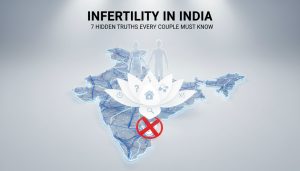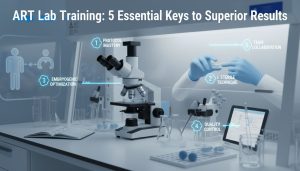PCOS or Polycystic Ovary Syndrome is a condition that disturbs the female sex hormones.
It leads to an imbalance of female sex hormones essentially Estrogen and Testosterone, which leads to fertility issues.
What is PCOS?
Every month a woman generates tiny fluid-filled cysts called follicles.
These Follicles break into a mature egg that is ready for fertilization.
If unfertilized, the egg is flushed out of the body during menstruation. These functions are regulated by hormones such as Estrogen and Testosterone.
In a woman with PCOS, these hormones are imbalanced.
This has an impact on Ovulation and therefore on Fertility.
What are the Causes and Symptoms of PCOS?
The exact cause of PCOS is not certain. Although experts believe that lifestyle and unhealthy habits contribute to it. Some factors that have a direct link are-
- Genetics- Polycystic Ovary Syndrome often runs in the family. If your mother or sister has PCOS, there are higher chances that you will have it too.
- Insulin Resistance- The Pancreas produces insulin, a hormone that regulates our blood sugar levels and the ability to absorb sugar. Women with PCOS are resistant to insulin, and this increases their insulin levels. Increased insulin levels have been found to increase hormones androgen and testosterone which lead to many symptoms of Polycystic Ovary Syndrome.
- Low-grade inflammation- This occurs when white blood cells cannot fight infections. It also disturbs the functioning of the heart and blood vessels.
The Symptoms are varied and can develop at any age. Most common symptoms are-
- Irregular menses due to problems in ovulation
- Excessive acne
- Darkening of skin
- Excess weight gain
- Ovarian cysts
- Hair fall
- Changes in mood and depression.
Of the above, the most common symptom is the irregularity of menstrual cycles and hence, one must see a doctor when one notices this symptom.
Does PCOS affect Fertility?
PCOS and Infertility have a close link as the main function that PCOS effects are Ovulation. Because of high levels of hormones such as testosterone, ovulation may not occur or the follicles on the ovaries do not produce eggs.
This directly impacts fertility.
Irregular menses and ovulation cycles make it difficult to get pregnant.
Sometimes, although ovulation occurs or production of eggs takes place, the lining of the uterus does not support implantation.
This leads to a failed conception.
This does not mean that women with PCOS do not conceive. Almost 30% of women with Polycystic Ovary Syndrome conceive successfully.
A doctor may prescribe hormone therapy for inducing ovulation along with dietary and exercise changes.
One can couple this with a simple, non –invasive treatment such as a Home IUI to increase the chances of getting pregnant without being bound by Doctor’s appointments and hospital visits.






